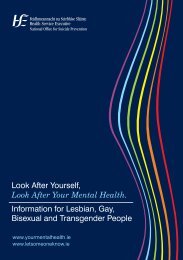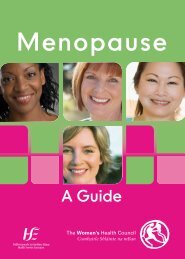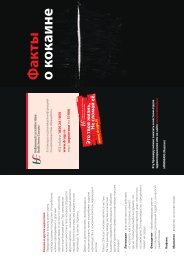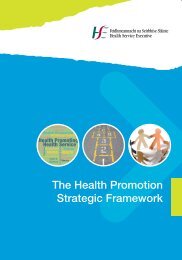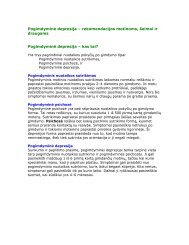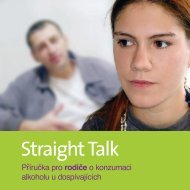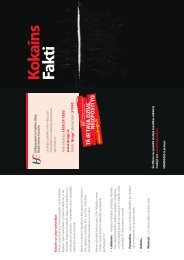Keep Well and Warm - Health Promotion Unit
Keep Well and Warm - Health Promotion Unit
Keep Well and Warm - Health Promotion Unit
You also want an ePaper? Increase the reach of your titles
YUMPU automatically turns print PDFs into web optimized ePapers that Google loves.
<strong>Keep</strong> <strong>Well</strong> <strong>and</strong> <strong>Warm</strong><br />
www.well<strong>and</strong>warm.ie<br />
This booklet contains advice,<br />
information <strong>and</strong> support schemes<br />
to help you keep well <strong>and</strong> warm.
Contents<br />
<strong>Keep</strong>ing well 01<br />
<strong>Health</strong> advice 03<br />
Energy advice 05<br />
Safety <strong>and</strong> security at home 09<br />
Financial <strong>and</strong> other support services 12<br />
Introduction<br />
Cold weather can be a problem for anyone, especially<br />
older people, children, people with a disability <strong>and</strong><br />
those with long-term illness.<br />
This booklet brings together all the information <strong>and</strong><br />
support available to householders who may experience<br />
difficulties keeping well <strong>and</strong> warm during winter.
01<br />
<strong>Keep</strong>ing well<br />
Eating well<br />
Food is fuel. It helps keep you warm.<br />
<br />
<br />
<br />
<br />
Have at least one hot meal a day.<br />
Have hot drinks throughout the day <strong>and</strong> one before<br />
bedtime.<br />
Eat fresh fruit <strong>and</strong> vegetables every day.<br />
<strong>Keep</strong> stocked up on basic food for the days when you<br />
may be unable to get out to the shops or do not feel<br />
like cooking. Consider cooking extra portions of dinner<br />
that you can freeze for another meal. Tinned <strong>and</strong> frozen<br />
foods are other healthy options to keep in stock.<br />
TIP: Most supermarkets <strong>and</strong> some grocery shops<br />
can deliver your shopping to you. Check with your<br />
local store <strong>and</strong> keep their phone number.<br />
Meals on wheels<br />
This service provides a hot<br />
meal to people of any age<br />
who are unable to cook for<br />
themselves or have no other<br />
way of getting a hot meal.<br />
It is available in lots of areas<br />
around the country. Ask your<br />
public health nurse or GP for<br />
details of your local service.
02<br />
<strong>Keep</strong>ing active<br />
<br />
<br />
Walk around the house regularly.<br />
If you have difficulty walking or moving your arms <strong>and</strong><br />
legs, wiggle your fingers <strong>and</strong> toes while sitting.<br />
<strong>Keep</strong>ing warm<br />
<br />
<br />
<br />
<br />
Wear several layers of light clothes instead of one<br />
thick layer.<br />
Wear clothes made from wool, cotton or fleecy<br />
synthetic fibres.<br />
Wear thermal underwear during the winter.<br />
In very cold weather:<br />
• sleep with warm bedding <strong>and</strong> warm pyjamas or<br />
night dress,<br />
• wear bed socks <strong>and</strong> a night cap, <strong>and</strong><br />
• keep a flask with a hot drink by your bed.<br />
<strong>Keep</strong>ing your home warm<br />
Use a room temperature monitor card (included in this booklet)<br />
to make sure your house is warm enough. If the temperature<br />
falls below 16ºC you could be at risk of hypothermia (when<br />
your body gets too cool to function properly).<br />
<br />
<br />
<br />
<br />
<br />
<strong>Keep</strong> the living room warm throughout the day<br />
(21º C if active, 24º C if inactive).<br />
Have heavy well-fitted curtains. Close them in the<br />
evening.<br />
Heat your bedroom before going to bed <strong>and</strong> make sure<br />
the room is warm before you get up in the morning.<br />
Close internal doors <strong>and</strong> do not leave windows open<br />
for long periods.<br />
Draught proof around windows, external doors <strong>and</strong><br />
letter box flaps to keep in heat. Make sure there is<br />
enough ventilation if you are using a natural gas or<br />
solid fuel fire in a room.
03<br />
<strong>Health</strong> advice<br />
Coldness can lead to an increase in chest infections, including<br />
influenza <strong>and</strong> pneumonia <strong>and</strong> other health problems.<br />
Signs <strong>and</strong> symptoms of hypothermia<br />
Hypothermia happens when the body temperature drops<br />
below normal. If you have a number of the following symptoms,<br />
you could be at risk of hypothermia.<br />
<br />
<br />
<br />
<br />
<br />
<br />
<br />
Not feeling cold, even when the temperature is low<br />
Drowsiness<br />
Slurred speech<br />
Feeling unsteady when moving<br />
Pale <strong>and</strong> puffy face<br />
Feeling confused<br />
Cold skin in areas that are normally covered by clothing,<br />
for example stomach, armpits <strong>and</strong> so on.<br />
Flu injection<br />
The best time to have your flu injection is in September<br />
or October. Protection lasts for a year, so you should get it<br />
annually. The injection is free <strong>and</strong> available from your GP<br />
(there may be a GP fee for non-medical card holders).<br />
Out-of-hours GP services<br />
The GP out-of-hours service is an urgent medical service<br />
provided by doctors <strong>and</strong> nurses outside normal practice hours.<br />
The service runs from 8pm to 8am, Monday to Friday, <strong>and</strong> all
04<br />
day Saturday, Sunday <strong>and</strong> bank holidays. If you have a medical<br />
card or a GP Visit Card, the service is free. If not, the doctor will<br />
charge a fee for the visit. Medical advice given by nurses or<br />
doctors over the phone is free of charge.<br />
Call the HSE Information Line 1850 241 850 to find your local<br />
service.<br />
If you depend on medical equipment at home, such as home<br />
kidney dialysis or oxygen machines, make sure to tell ESB<br />
Customer Supply. They will place you on their medical<br />
register. Phone: 1850 372 372<br />
If you live alone <strong>and</strong> feel ill, let someone know.<br />
If you have been in hospital, before you go home,<br />
ask a nurse to ring a friend or relative who can heat<br />
your home <strong>and</strong> get in some food.
05<br />
Energy advice<br />
Free electricity, gas <strong>and</strong> fuel allowances<br />
The Department of Social <strong>and</strong> Family Affairs’ Household Benefits<br />
Package contributes about €540 a year towards the electricity,<br />
natural gas or bottled gas bills for eligible households.<br />
The Electricity Allowance covers your domestic st<strong>and</strong>ing<br />
charge, 400 units of electricity per bill <strong>and</strong> VAT on both. If you<br />
do not use your full allowance in one billing period, you can<br />
carry over up to 1200 units in total to your next bill.<br />
The Natural Gas Allowance covers normal st<strong>and</strong>ing charges<br />
<strong>and</strong> gas kilowatt hours equal in value to that of the Electricity<br />
Allowance.<br />
The Bottled Gas Allowance is available if your home is not<br />
connected to an electricity or natural gas supply.<br />
You may be entitled to a Fuel Allowance if you are receiving<br />
a social welfare payment. It is worth €640 a year, paid at €20 a<br />
week for 32 weeks from September to April. If you qualify <strong>and</strong><br />
live in a listed smokeless area, you may receive an additional<br />
amount of €3.90 a week.<br />
The Household Benefits Package also provides payment<br />
towards your telephone bills <strong>and</strong> covers the cost of your TV<br />
Licence.<br />
How to submit your meter reading<br />
If the meter reader is unable to gain access to your meter,<br />
he/she will leave a card. If necessary, ask a family member<br />
or friend to help you read your meter <strong>and</strong> follow the<br />
instructions on the card to submit the reading.
06<br />
Save money on your energy bills<br />
<br />
<br />
<br />
<br />
<br />
Buy heaters that are controlled by a thermostat, as they<br />
use energy more efficiently.<br />
Fit a good lagging jacket to your hot water cylinder. It<br />
will keep water warmer for longer.<br />
During very cold weather, it may be cheaper to heat just<br />
one room <strong>and</strong> use it for living <strong>and</strong> sleeping. Get your<br />
family or friends to prepare a bed in the living area.<br />
Have a timer fitted to your immersion heater <strong>and</strong> only<br />
set it for the required time to heat the water when you<br />
need it.<br />
Use energy saver CFL light bulbs – they use 80% less<br />
electricity than ordinary bulbs.<br />
Check www.powerofone.ie for further tips on saving energy.<br />
<strong>Warm</strong>er Homes Scheme<br />
If you find it hard to afford to keep your home warm <strong>and</strong><br />
comfortable or to pay the fuel <strong>and</strong> electricity bills, you could<br />
benefit from the help available through the <strong>Warm</strong>er Homes<br />
Scheme. This scheme is delivered mainly through community<br />
organisations <strong>and</strong> is co-ordinated <strong>and</strong> part-funded by<br />
Sustainable Energy Irel<strong>and</strong> (SEI).<br />
The <strong>Warm</strong>er Homes Scheme provides the following services:<br />
<br />
<br />
<br />
<br />
<br />
Draught proofing<br />
Attic insulation<br />
Lagging jacket<br />
Low energy light bulbs<br />
Cavity wall insulation, where appropriate <strong>and</strong> available.
07<br />
Who can apply?<br />
The scheme is for householders who receive Fuel Allowance,<br />
Disability Benefit or Invalidity Benefit. Services are provided<br />
either free of charge or for a small fee (about €100).<br />
Please contact 1800 250 204 for more information <strong>and</strong> to<br />
find your nearest provider.<br />
Housing Aid for Older People<br />
This scheme is managed by local authorities <strong>and</strong> aims to<br />
assist older people in carrying out essential repairs <strong>and</strong><br />
improvements to their homes.<br />
Funding is available for varied works, which may include:<br />
<br />
<br />
<br />
<br />
structural repairs or improvements,<br />
re-wiring,<br />
repairing or replacing windows <strong>and</strong> doors, <strong>and</strong><br />
providing water, sanitary services, heating, insulation,<br />
cleaning, painting <strong>and</strong> so on.<br />
The amount of grant you may receive depends on your<br />
household income. The maximum grant available is €10,500.<br />
The full cost of works is available to those with annual<br />
household income of less than €30,000. This reduces in stages<br />
to 30% of the approved cost of works for those with annual<br />
household incomes of €54,001 to €65,000.<br />
Contact your local authority directly to apply.
08<br />
Difficulty paying fuel bills?<br />
If you are experiencing payment difficulties, contact your<br />
natural gas or electricity supplier straight away. All suppliers<br />
offer different payment arrangements. You should be able to<br />
put in place a payment plan that you <strong>and</strong> your supplier can<br />
accept. Sometimes a pre-payment meter may be fitted at<br />
your home to allow you to remain on gas or electricity while<br />
repaying a debt <strong>and</strong> prevent you building up any further debt.<br />
Electricity <strong>and</strong> gas suppliers will not disconnect* your supply<br />
for non-payment of bills from November to March if you are on<br />
the industry Special Services Register <strong>and</strong>:<br />
<br />
<br />
<br />
aged 66 years or over,<br />
living alone or with another elderly person, or<br />
living with a minor.<br />
To register, contact your supplier directly.<br />
*Please note that these registers cannot cover situations where there is an<br />
unexpected power failure in the network.<br />
What one unit of electricity can buy you:<br />
Instantaneous electrical shower<br />
7 – 10 mins<br />
Immersion water heater<br />
15 – 20 mins<br />
Cooker (1 large ring)<br />
Kettle<br />
20 – 40 mins<br />
Tumble Dryer<br />
Toaster (2 slice)<br />
40 – 60 mins<br />
Washing machine<br />
Dishwasher<br />
70 – 100 mins<br />
Desktop computer (including monitor) 4 – 6 hours<br />
TV 28”<br />
7 – 9 hours<br />
100 watt ordinary light bulb 10 hours<br />
20 watt energy saving (CFL) light bulb 50 hours<br />
The figures above give an average usage guide.<br />
Actual usage will depend on the age <strong>and</strong> efficiency of appliances.
09<br />
Safety <strong>and</strong> security at home<br />
Home safety<br />
<br />
<br />
<br />
<br />
<br />
<br />
<br />
<br />
If you have an open fire, use a fire guard at all times.<br />
Do not hang clothes near a fire.<br />
If you have an electric under-blanket, always switch it<br />
off before you get into bed.<br />
Never fill a hot water bottle with boiling water <strong>and</strong><br />
make sure you put it in a cover.<br />
Never use a hot water bottle with an electric blanket.<br />
Never smoke in bed.<br />
Leave a low energy light on over night in the hall or<br />
stairs area to avoid accidents.<br />
Make sure there is enough ventilation if you are using<br />
a natural gas or solid fuel fire in a room. Consider<br />
installing a carbon monoxide alarm close by.<br />
Smoke alarms<br />
Make sure you fit smoke alarms where you can clearly hear<br />
them. This means both upstairs <strong>and</strong> downstairs in a two-storey<br />
house. Get a friend or family member to test the alarm batteries<br />
regularly. Use alarms that have both a sound <strong>and</strong> light signal.<br />
Power cuts<br />
In case of a power cut, have a torch beside your bed <strong>and</strong> in<br />
your living room. Check batteries regularly. You can contact ESB<br />
Networks for the latest information on when your electricity will<br />
be restored on 1850 372 999.
10<br />
Home security<br />
<br />
<br />
<br />
<br />
Never let strangers into your home. Ask for<br />
identification first – if you are not sure, do not<br />
let them in.<br />
Do not employ workmen that call to your door.<br />
Do not keep large amounts of money at home.<br />
Fit timing switches to your lighting <strong>and</strong> consider<br />
installing extra security lighting.<br />
Personal alarms<br />
<br />
<br />
<br />
There may be a personal alarm service in your area.<br />
If you would like to get one, contact your local<br />
community services or ask your public health nurse,<br />
doctor or local Garda.<br />
Get a relative or friend to check that it is working.<br />
If you have a personal alarm make sure to<br />
wear it at all times.<br />
Do not hesitate to ring the personal alarm service<br />
in your area. Someone is available to answer your<br />
call 24 hours a day.
11<br />
Scheme of Community Support for Older People<br />
The Scheme of Community Support for Older People provides<br />
grants for community groups, such as Community Alert or<br />
Neighbourhood Watch, to support them in improving the<br />
security of their older members. Funding is now available for<br />
the following security equipment:<br />
<br />
<br />
<br />
<br />
<br />
socially-monitored alarms,<br />
window locks, door locks <strong>and</strong> door chains,<br />
security lighting,<br />
smoke alarms, <strong>and</strong><br />
interior emergency lighting on off-shore isl<strong>and</strong>s.<br />
Further information can be obtained from the Department of<br />
Community, Rural & Gaeltacht Affairs who can be contacted at<br />
071 910 7821 / 7819.<br />
Applications can be made at any time of year.<br />
Be a good<br />
neighbour –<br />
be aware <strong>and</strong><br />
check on your<br />
neighbours.<br />
Do not leave it<br />
to others – they<br />
may have left it<br />
to you.
12<br />
Financial <strong>and</strong> Other Support Services<br />
Money Advice <strong>and</strong> Budgeting Service<br />
The Money Advice <strong>and</strong> Budgeting Service (MABS) is a free <strong>and</strong><br />
confidential service for people who have problems managing<br />
debts <strong>and</strong> money. The 65 MABS offices in Irel<strong>and</strong> have<br />
professional money advisers who can assist people by:<br />
<br />
<br />
<br />
checking their income to make sure they are getting all<br />
their entitlements such as social welfare payments,<br />
contacting creditors (people or businesses that are<br />
owed money) with offers of payment if they are not<br />
able to do it themselves, <strong>and</strong><br />
helping clients decide on the best way to make the<br />
payments <strong>and</strong> making out a budget.<br />
You can contact MABS through:<br />
<br />
<br />
<br />
its MABS National Telephone Helpline 1890 283 438<br />
(1890 BUDGET)<br />
its website www.mabs.ie<br />
the network of local MABS companies (see your local<br />
phone directory for addresses).<br />
Society of St Vincent De Paul (SVP)<br />
SVP volunteers work confidentially with people in need to help<br />
them if they are unable to pay for fuel. If you are struggling<br />
with household bills <strong>and</strong> energy costs, SVP can provide advice<br />
<strong>and</strong> support, including payments for gas, electricity, oil <strong>and</strong><br />
solid fuel costs. If you need assistance, visit the SVP website,<br />
www.svp.ie, or call 855 0022 (if you live in Dublin) or<br />
(01) 838 6990 (if you live outside Dublin).
This booklet is printed on environmentally friendly paper stock.<br />
This booklet is also available in Irish.<br />
If you would like a copy,<br />
contact Sustainable Energy Irel<strong>and</strong><br />
on 1850 376 666<br />
www.well<strong>and</strong>warm.ie
www.well<strong>and</strong>warm.ie




